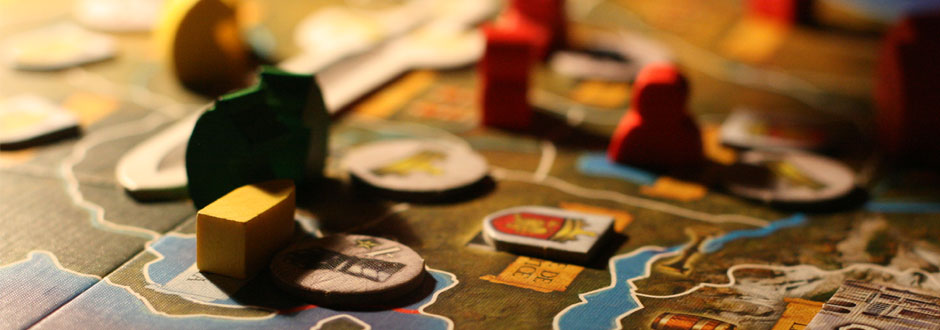Chris Backe is the one-man show behind Entro Games, a game design company focusing on easy-to-learn and easy-to-play games. He’s a digital nomad currently based in Eastern Europe, and travels with his wife Laura.
So you just finished playing something at a friend’s house and thought of a brilliant idea for a game of your own? Let’s make it into something we can play-test!
Game Design - Theme & Mechanics
In the world of game design, we have two main parts: a theme and the mechanics of the game. I’ve heard these compared to the melody and lyrics of a song: one can come as an idea first, and you ensure the other one fits with it. I’d simply suggest that one guides the other.
Themes guide the player into understanding the when, who, and where of the scene — and all three of these can often be answered in a single sentence. They help explain what fits or feels natural in the game. If the theme of your game is, say, pirates, it’s highly unlikely a laser weapon would be used.
Mechanics, according to my glossary of board game terms, are essentially “the rules or methods of gameplay."
BoardGameGeek has a complete list here, but some of the terms can be bewildering... “Secret Unit Deployment”? “Simultaneous Action Selection”?
The good news here: once you’ve seen a mechanic in action, you’ll likely see it again and again in other games. Something like a ‘press your luck’ mechanic is present in dozens of games, for example.
Mechanics, according to my glossary of board game terms, are essentially “the rules or methods of gameplay."
BoardGameGeek has a complete list here, but some of the terms can be bewildering... “Secret Unit Deployment”? “Simultaneous Action Selection”?
The good news here: once you’ve seen a mechanic in action, you’ll likely see it again and again in other games. Something like a ‘press your luck’ mechanic is present in dozens of games, for example.
Game Design - What will players be doing?
Now that you have a theme and/or a mechanic in mind, what do you want players to do during the game? It’s worth considering how complex you want the game to be, what’s thematically appropriate, whether it’s for kids or adults.
It’ll also be worth checking Board Game Geek or Kickstarter to see if there are similar games out there.
To give you a bit of a starting point, try this Mad-Libs-like introductory paragraph on for size:
[Game name] is a game for [2-4? 2-6? 4-8?] players that takes about [number] minutes to play. You are a [role] that’s trying to [in-game goal]. On your turn, you will [Roll dice? Play cards? Move meeples?]. Use your [Cards? Dice? Meeples?] to [Score points? Get cards? Capture tiles?] and [Score points? Get cards? Capture tiles?]. Win by [Scoring the most points? Getting to a certain place first?].
Obviously, you won’t know all the details when you start… but you can begin thinking about what sort of game you want to play. Here’s an example, using my still-in-play-testing game Pirate Grannies:
Pirate Grannies is a game for 2-8 players that takes about 20-30 minutes to play. You are a granny that’s trying to escape the ship, start a mutiny, find a treasure, or capture another ship. On your turn, you will move to a new spot and gain new skills or influence. Use your Granny cards to gain more skills. Win by being the first with enough skills to escape the ship, start a mutiny, find a treasure, or capture another ship.
Again, you won’t know all the details to start. Until you’ve played a few rounds or tried some different ideas, you probably won’t know how long it will take to play. That’s OK, and there are a few thought processes about that:
- Choose the length you want, then fit the gameplay around that.
- Choose the gameplay you want, then fit the length around that.
- Don’t worry about it quite yet, as it’ll likely all come together one way or another.
I have heard from some game designers that they specifically aim to make a game, say, 30 minutes long or an hour long. So long as the game is fun to play, I would submit there’s a gamer out there willing to play it… though I would also say there’s definitely a trend towards shorter games (e.g. games that play in an hour or less).
Make sure that you check out my next post, where I’ll get into prototyping and some of the tools I use.
Til then, play great games!











Share